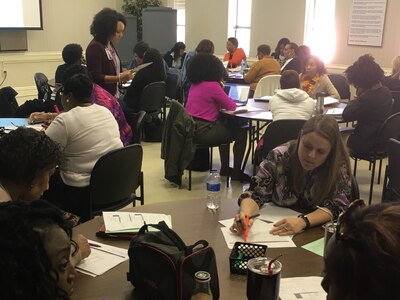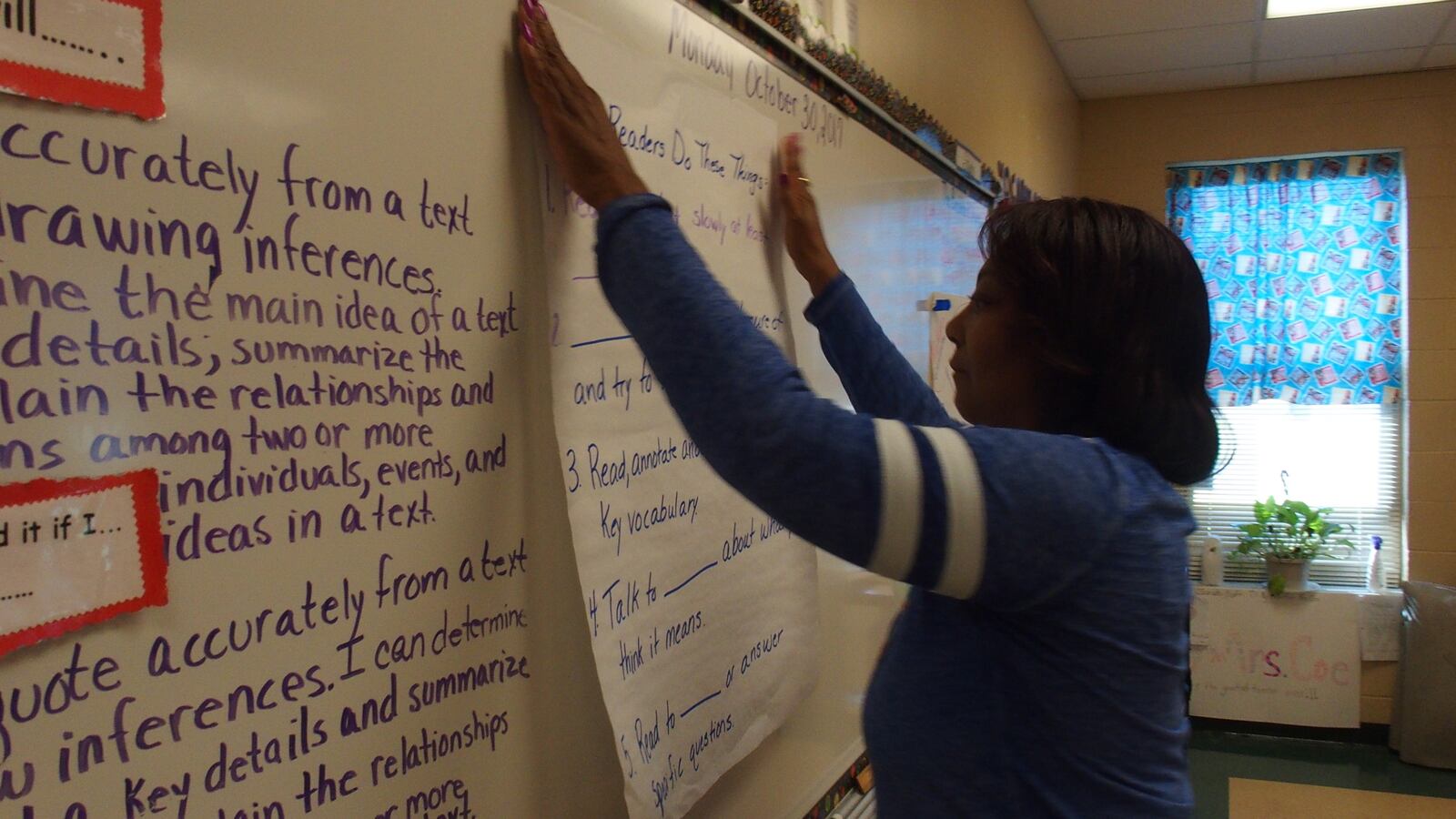Kicking off a lesson using a new curriculum for English language arts, Rachelle Taylor reads aloud to elementary-age students and then invites questions about the text and a few related photographs.
Under Shelby County Schools’ new curriculum known as Expeditionary Learning, the point isn’t for students to understand every little detail, but to get them used to asking good questions. Instead of lecturing, the teacher becomes a facilitator and guide who lets students do most of the discovering.
“This is what good readers do: ask questions,” explained Taylor, a district adviser for elementary English. “We’re building (reading skills) in order to go deeper.”
This year, Shelby County Schools is adding Expeditionary Learning to its curriculum mix as the district seeks to expose its students to more complex reading content. Last school year, only a fifth of them met the state’s expectations in English language arts on the state’s new standardized test known as TNReady.
The change officially starts on Monday for grades 3-5, then in January for grades K-2. Middle schoolers began using Expeditionary Learning at the beginning of this school year.
The goal is to better equip students to take TNReady, which is based on the Common Core learning standards. Ultimately, it’s about giving them a better foundation for college and career by shifting emphasis from rote memorization to critical thinking skills.

“This is going to afford our students the opportunity to see the same type of information and questions every day that they’re going to be tested on in the spring,” said Chief of Schools Sharon Griffin. “We feel really good that exposing the kids to this curriculum will not only help them master the content but that we’ll see those results in a couple of years in our data.”
For middle schoolers, Expeditionary Learning has replaced Journeys, an English curriculum that’s been in place in Memphis schools for several years. For grades K-5, Journeys will remain, but will be supplemented with the new curriculum.
“Journeys was not rigorous enough,” Griffin said. “It had a few complex texts, but we needed our students to be exposed on a daily basis. We’re trying to make sure we’re practicing exactly like we’re going to play.”
Expeditionary Learning was created by a nonprofit network of schools in New York in partnership with that state’s department of education. It’s already being used in the Memphis area by Germantown Municipal School District, which last year had the highest TNReady scores in Tennessee in English. Several Memphis charter schools also use Expeditionary Learning.
For teachers with Shelby County Schools, preparation for and training on the new curriculum has been going on since the end of last school year.
But Carolyn Coe has known the change was coming for a long time, and is excited that it’s finally here. The fifth-grade teacher at Winridge Elementary has been following other states using Common Core-aligned curriculum and began incorporating the approach gradually into her own classroom instruction. Last year, her students were filmed in a training lesson that was led by a district literacy adviser. As she watched her class, she observed that her quieter students were chiming in and her stronger ones were helping those who were struggling, reinforcing their own learning.

“Before, I was doing a lot of lecturing. But with Expeditionary Learning, the children are doing the bulk of the work,” Coe said. “They’re learning by doing. They’re piggybacking off each other and learning from each other.”
Criticism about the change is based mostly on its November start for grades 3-5. School has already been in session for 12 weeks.
“If you start in the middle of the year, you won’t get through the curriculum before the test,” said Lisa Jorgenson, a kindergarten ESL teacher who is also a teachers union representative.
Griffin said Journeys has been sufficient for the first few months of the school year. “We wanted to make sure we didn’t just cold turkey snatch the Journeys curriculum,” she said. “Journeys is not a bad curriculum. The amount of complex text just wasn’t enough to take us all the way to June.”
The district had a bumpy rollout of professional development for Eureka Math, which launched this year following several pilots. Some materials arrived late. Griffin said all the materials are in place for next week’s introduction to Expeditionary Learning, and the school board this week approved the purchase of more K-2 materials for next semester.

Teacher training has been happening up to the last minute. Some schools, like Winridge, brought in substitute teachers on Wednesday so that English teachers could plan lessons together and prepare materials.
Schools are also being asked to replace at least one faculty meeting each month with a “collaborative planning” period for educators to practice lessons and work through issues. Collaboration has been a cornerstone of success behind the Innovation Zone, the district’s school turnaround model. District leaders want to see that practice spread.
Teachers for and against the change spoke to board members this week. All agreed the current curriculum has not prepared students well.
“The curriculum we teach is vitally important to achievement,” said Corey VanHuyster, an English adviser who helped implement Expeditionary Learning for middle schoolers. “It will be one of the major factors on whether or not our students perform on end-of-year testing and more importantly if they are literate and well-read students.”

